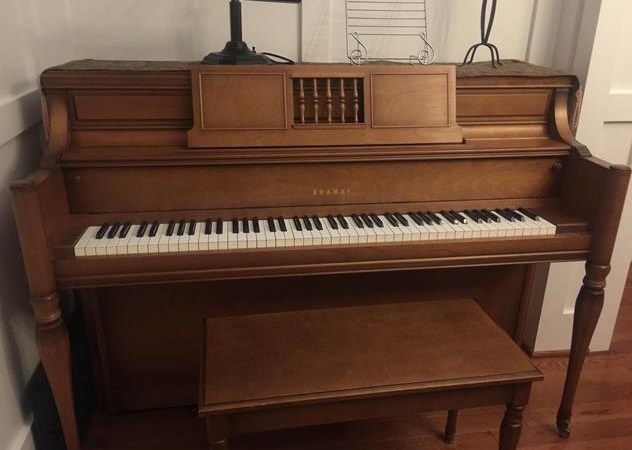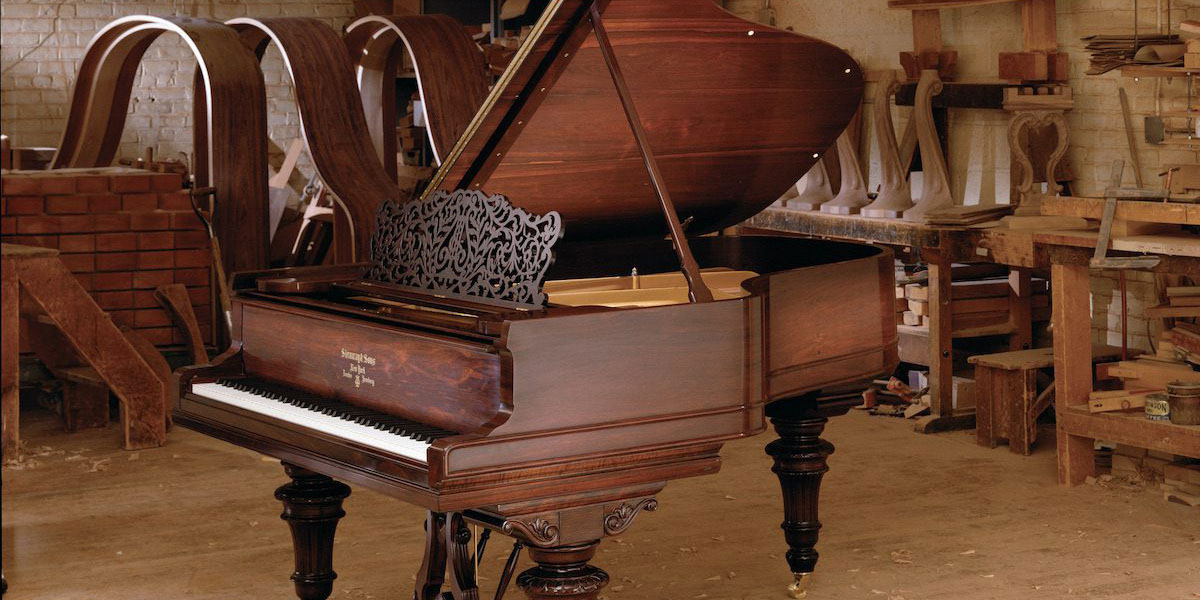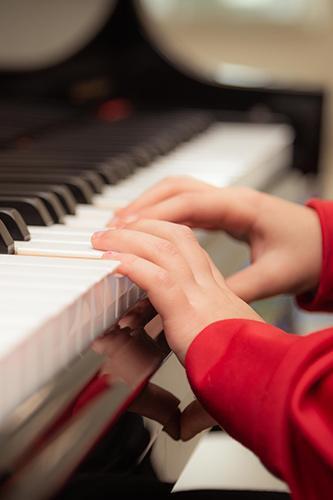Pianos do not inherently sound better with age; their sound quality depends on maintenance and environmental conditions. Some older pianos can develop a rich tone, but this is not solely due to age.
Pianos are majestic musical instruments that hold a special place in the hearts of musicians and music lovers alike. Over time, a well-maintained piano can indeed develop a full, mature sound that many appreciate. Yet, the notion that pianos improve with age is not a guarantee but rather an outcome of careful attention.
Regular tuning, climate-controlled environments, and professional repairs contribute to the piano’s tonal evolution. On the flip side, neglect can lead to deterioration and poor sound quality, regardless of the piano’s age. It is this intricate balance between care and time that dictates whether an aging piano will sing a sweeter tune or fall silent in discord.

Credit: elevatormondays.com
The Aging Of Pianos
Like fine wine, some say pianos also improve with age. But is this true? Certainly, a piano’s journey through the years isn’t just a countdown; it’s a transformation. Let’s explore how time affects the beloved instrument.
Material Maturation
The heart of a piano lies in its materials. Wood, its primary component, is a living, breathing entity even after being fashioned into an instrument. As wood ages, it settles. It adapts to its environment. This evolution can sometimes lead to a richer, more lush sound. The soundboard, made of spruce, is particularly crucial. It resonates with the strings, affecting the piano’s voice. Over years, as the soundboard matures, the tone can become more mellow and warm.
- Spruce Soundboards: They age like seasoned actors, with more character to show.
- Hardwood Components: Hardwoods used in pianos, such as maple, grow richer and more resonant over time.
Wear And Resonance
Consider the wear and tear on a piano as an evolution rather than mere depreciation. The hammers and strings shaping a piano’s tone change as they experience the world: every press of the keys, every open and close of the lid. Hammers become compacted, and strings may lose their initial brittleness, sometimes resulting in a smoother dialogue between them. This symbiosis can allow a piano to bloom, bringing forth a resonance that whispers tales of its experiences.
| Component | Change Over Time |
|---|---|
| Hammers | Become more compacted, producing a richer tone. |
| Strings | Less brittle, contributing to a smoother sound. |
| Pedals | May wear down, affecting the piano’s dynamic range. |
Each piano has its own narrative. The relationship between a pianist and their instrument is personal and develops over time. True beauty may emerge as the piano ages, not despite the years, but because of them.

Credit: msteinert.com
Factors Affecting Piano Sound Over Time
Many wonder if pianos improve like fine wine over time. The answer is complex and depends on various factors. A piano’s age can affect its sound quality. However, not all changes lead to better sound. Let’s explore some of the key factors that influence a piano’s sound over the years.
Craftsmanship And Design
The foundation of a piano’s lifespan lies in its creation. The materials used and the attention to detail during construction can predict how well a piano will age. Durable woods and precise assembly contribute to a robust structure. This enduring build can withstand years of play.
High-quality components have a significant impact on longevity and sound. For instance, a sturdy cast iron frame holds tuning better. This frame helps maintain the piano’s sound over time. Hand-crafted pianos, known for bespoke craftsmanship, often age well. They develop a rich and full tone as the materials settle.
Environmental Conditions
The environment around a piano affects its longevity and tone. Pianos thrive in stable conditions. They are sensitive to changes in temperature and humidity. Below are factors influencing a piano in its setting:
- Humidity variations can cause wood to warp. This warping impacts soundboard shape and string tension.
- Temperature swings lead to repeated expansion and contraction of materials. Over time, this can harm the piano’s sound.
- Consistent care protects piano sound quality. Regular tuning, for instance, is essential. It ensures the instrument keeps its intended pitch.
Consider the placement of a piano in a room. Direct sunlight or near a heating vent can be harmful. Optimal conditions include a humidity level of around 45 percent. The temperature should be stable, ideally between 68°F and 72°F (20°C to 22°C).
Myths And Realities
In the world of pianos, stories swirl about the enchanting tone of aged instruments. Distinguished characters assert that time serenades pianos to perfection. The truth, however, is more nuanced. Let us explore the interplay of myths and realities concerning the aging of pianos.
Antique Value Vs. Performance
Vintage pianos carry an allure, often mistaken for superior sound. While antiquity may hike up the price, older pianos can be temperamental. Without meticulous maintenance, they may not hit the high notes of expectations.
- Wood matures – a reality lending subtle changes to sound quality.
- Parts wear out – felts compress and strings stretch, potentially dulling the sound over years.
- Regular tuning and care are critical for peak performance.
Popular Beliefs Put To The Test
That golden-aged timbre often attributed to older pianos? It’s time for a reality check.
| Popular Belief | Reality |
|---|---|
| “Older pianos have richer tones.” | Richer tones often stem from design, not age. |
| “Wood seasoning enhances sound.” | Partially true, yet inconsistent across all instruments. |
| “Ancient pianos are better built.” | Construction methods vary; some modern pianos outperform antiques. |
It’s evident that while some aged pianos offer unique charm, age alone is not a sound quality determiner. Prospective buyers should evaluate each instrument based on its merits, current condition, and sound, rather than the year it was crafted.

Credit: pianopricepoint.com
Maintenance’s Role In Sound Quality
Just like a fine wine, some might say that a piano’s sound can mature and grow richer over time. Yet, this is not simply a matter of age. Proper maintenance plays a pivotal role in a piano’s sound quality. Without regular care, even the most exquisite instrument can fall into disrepair, losing the charm it might have developed with age. Here’s how maintenance ensures that pianos don’t just age, but they age like stars of the concert hall.
Tuning Stability
The stability of a piano’s tuning largely determines its aural beauty. A piano needs regular tuning to keep its notes sounding clear and harmonious. As wooden parts expand and contract with humidity changes, strings can stretch and slacken. Here’s why a well-maintained piano can hit the right notes when it comes to tuning stability:
- Regular Tuning: Keeps the strings at the correct tension.
- Climate Control: Helps prevent the wood from warping.
- Use of Humidifiers or Dehumidifiers: Maintains consistent moisture levels.
Restoration Techniques
The art of piano restoration breathes new life into older instruments. Specialized technicians can rejuvenate a piano, enabling it to sing beautifully once more. Check out these popular restoration techniques that keep a piano sounding fantastic through the years:
| Technique | Description |
|---|---|
| Soundboard Repairs | Mending cracks and ensuring the soundboard’s integrity. |
| String Replacement | Updating old and worn strings for brighter tone quality. |
| Action Rebuilding | Refreshing the mechanical parts for a responsive touch. |
Notable Aged Pianos
Imagine a piano, not just any piano, but one with a history as rich as the music it creates. Notable aged pianos carry stories in each note, captivating audiences with their timeless melodies. These instruments, often centuries old, grow more resonant and enchanting with each passing year. They exemplify craftsmanship that withstands the test of time.
Famous Concert Instruments
- Steinway & Sons: Crafted in 1853, it is known for its powerful sound and incredible durability.
- Bechstein: Preferred by composers like Liszt, it boasts a distinctive warm tone that improves with age.
- Bösendorfer: Established in 1828, these pianos are praised for their rich bass and vibrant treble.
Historic Piano Profiles
A glimpse into the lives of historic pianos reveals their impact on music and history:
| Piano | Year | Notable Feature |
|---|---|---|
| Mozart’s Walter | 1782 | Delicate sound, played by Mozart himself |
| Chopin’s Pleyel | 1839 | Velvety tone, Chopin’s favorite for composing |
| Beethoven’s Broadwood | 1817 | Robust volume, Beethoven’s composition partner |
Choosing An Older Piano
Are you considering bringing the rich melody of an older piano into your home? The allure of a time-seasoned instrument is undeniable. An older piano might not only carry a touch of history but also a uniquely matured sound that newer models can rarely match. Let’s delve into what makes an aged piano a potential aural treasure as we explore your journey in choosing an older piano.
Sound Character Assessment
Every piano tells a story through its sound. As pianos age, their tone can deepen, providing a warmth that speaks volumes of its journey. Evaluating the sound character of an older piano is essential. Listen for:
- Sound richness – The mellow, rounded tones that develop over time.
- Volume dynamics – Does it whisper and roar with ease?
- Evenness of the keys – Consistency across the keyboard is crucial.
A thorough assessment will reveal if the piano has matured like fine wine or if it has soured with age. A seasoned technician can help determine the instrument’s sound integrity.
Investment vs. InstrumentInvestment Vs. Instrument
When you come across an older piano, decide if it’s an investment or an instrument for your musical journey. Some pianos are collectors’ items, sought after for their:
| Brand Prestige | Historical Value | Rarity |
|---|---|---|
| Names like Steinway or Bechstein | Owned by a famous musician? | Limited editions |
Yet, an instrument’s true worth is in its playability and the joy it brings to the musician. Ensure your choice aligns with your intentions — to treasure or to play. Sometimes, an older piano strikes the perfect chord as both a sound investment and a trusty instrument.
Does Regular Piano Tuning Affect the Sound Quality and Aging of Pianos?
Regular piano tuning is crucial for maintaining the sound quality and overall condition of pianos. Depending on usage and environmental factors, experts recommend scheduling piano tuning at least every six months. This maintenance helps prevent the piano from aging prematurely and ensures consistent, high-quality sound. How often piano tuning is done is important for the longevity of the instrument.
Frequently Asked Questions Of Do Pianos Sound Better With Age
Is A 20 Year Old Piano Still Good?
A 20-year-old piano can still be of good quality if it has been well-maintained and regularly tuned. Age alone doesn’t determine a piano’s condition; proper care does.
Why Are Old Pianos Better?
Old pianos often have superior craftsmanship and materials, leading to richer, more resonant sound quality over time. Their matured wood can enhance tonal depth, making them highly valued by musicians.
Is It Ok To Buy A 50 Year Old Piano?
Buying a 50-year-old piano can be acceptable if it’s well-maintained and in good working condition. Always inspect and play the instrument or consult a professional before purchasing.
Why Do Old Pianos Sound Different?
Old pianos sound different due to natural aging of materials like wood and felt, causing changes in tone and resonance. Wear and environmental factors also contribute to the altered sound.
Conclusion
Pianos can indeed grow richer in sound as they age. This maturity brings a depth that audiophiles and musicians cherish. Regular maintenance is key to this sonic enhancement. Embrace the journey of your piano—it may just reward you with unparalleled melodies that echo through time.
